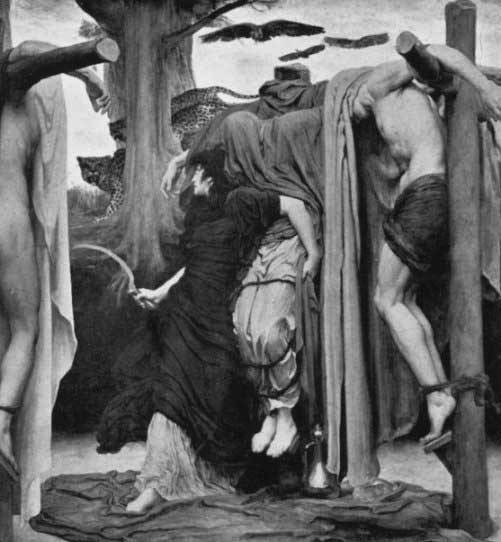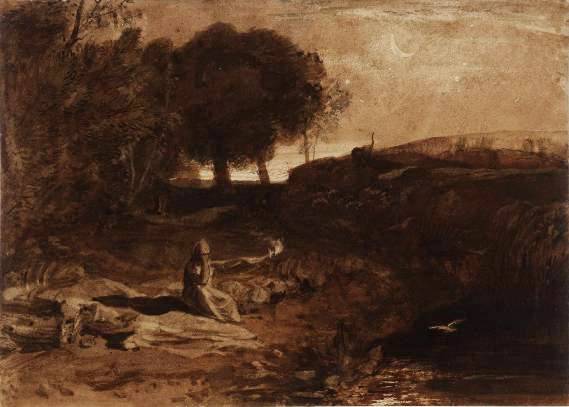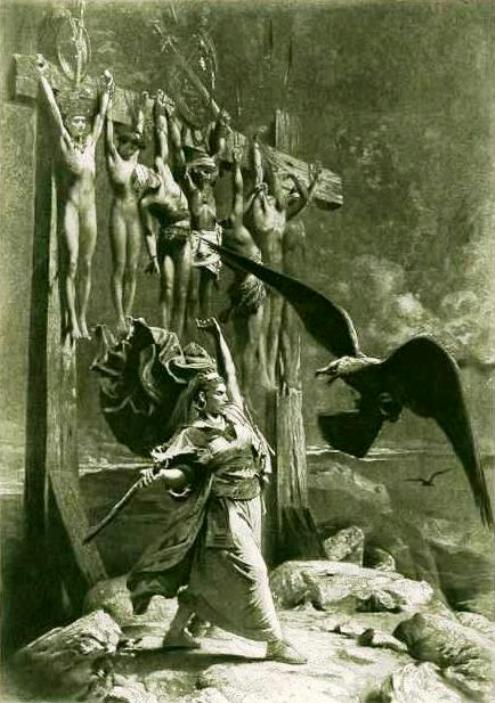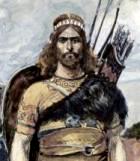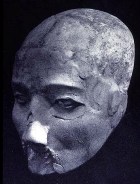Who was Rizpah in the Bible?
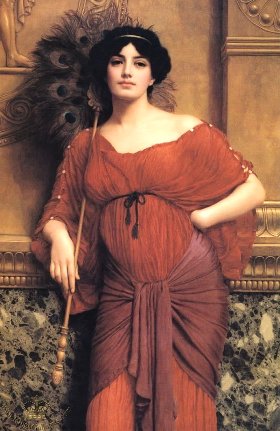
Rizpah was the concubine of King Saul, the troubled mentor of young David.
- A royal concubine was outstanding in beauty and intelligence, and married by the king because he loved or desired her.
- A full wife (not a concubine) was usually married because she was a physical token of an alliance between two kingdoms or states (see the story of Basemath and Tapheth).
A wife had higher social status than a concubine, but had not been directly chosen for herself.
Rizpah was loved by King Saul, and bore him at least two sons. Saul had a number of other sons and some of them, probably born to royal princesses, were of higher social status than Rizpah’s sons.
Showdown between Saul and David
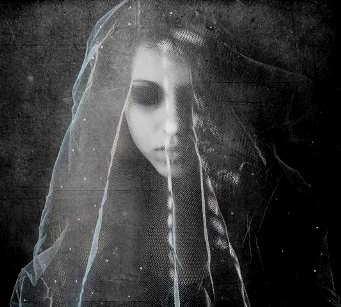 These people lived at a difficult time. David ruled Judah but not Israel; he wanted to rule all, not part of, the country.
These people lived at a difficult time. David ruled Judah but not Israel; he wanted to rule all, not part of, the country.
He led a rebellion against King Saul, and at the final showdown at Mount Gilboa, Saul and three of his eldest sons were killed in battle.
This meant that Ishbosheth, Saul’s fourth high status son, became king.
He did not seem well-suited to the task, but he was backed by a man called Abner,who had been Saul’s first cousin and commander-in-chief of Saul’s army. Abner was the best chance for the survival of the house of Saul, but Ishbosheth feared that Abner would make a play for the throne and take it for himself.
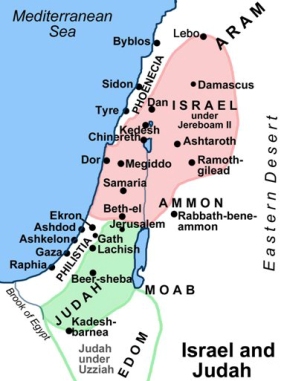
Map of Israel and Judah
Trouble came all too soon. Abner was accused of having sex with Saul’s widowed concubine, Rizpah. This was significant, because sexual intercourse with a member of the harem of a dead king was a way of laying claim to the throne.
Whether Rizpah had sex, consensual or not, with Abner, is unknown, but Ishbosheth certainly believed the accusation. He quarrelled with Abner and ejected him from the court.
If indeed there was sexual intercourse between Rizpah and Abner, it would be interesting to know who initiated it. The Bible story, written by men, supposed that Abner ‘took’ Rizpah against her will.
But Rizpah may herself have been making a power play by allying herself with Abner: if he became king, her social position and that of her sons might be improved, and her children would have a better chance of survival.

Ravenous wolf
After Abner’s departure, Rizpah was left defenceless. But despite Ishbosheth’s accusation, she and her sons survived.
Abner did not. He was assassinated shortly after he joined David, killed by David’s right-hand-man Joab. Not long after this, Ishbosheth too was killed by David’s men.
What happened to Rizpah’s sons?
Ishbosheth’s death was the signal for the systematic murder of all King Saul’s heirs – killing redundant heirs was common practice in the ancient world.
Rizpah’s sons hanged on the mountain
And this of course included Rizpah’s surviving son Armoni – though not Mephibosheth, who was spirited away and saved by a devoted nurse. Armoni, along with other heirs of Saul, was condemned and executed. The Bible says he was ‘hanged on the mountain’. This probably described some form or ritual execution.
Rizpah was powerless to stop it. One can only imagine the chaos and terror in the royal household of Saul at that time.
Perhaps the worst part was that the bodies of her sons were not buried, but left out on an open hillside to rot or be eaten by scavenging birds or animals.
It was David’s sickening act of revenge against their dead father, King Saul.
Rizpah must have witnessed their deaths, but when other people left the scene of the execution at the end of the day, she did not. She knew their bodies ought to have been taken down and buried, but no-one came to do this.
Her sons’ bodies simply continued to hang there in the open, even as night came down.
How did she react to this atrocity?
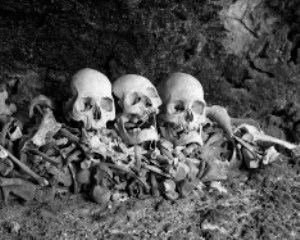
Then began a terrible vigil. Rizpah would not accept the fate meted out to her sons. One can only imagine the fury and anguish of a mother who has lost everything, everything.
She stayed at the scene of execution, guarding their hanging bodies night and day, good weather and bad, for between four to six months.
It became a scandal throughout the country.
Finally David was persuaded to let the bones of her sons be decently buried.
After that, her life and sanity utterly destroyed, she passed from sight.
Link to the Bible text for Rizpah’s story
Paintings of Rizpah
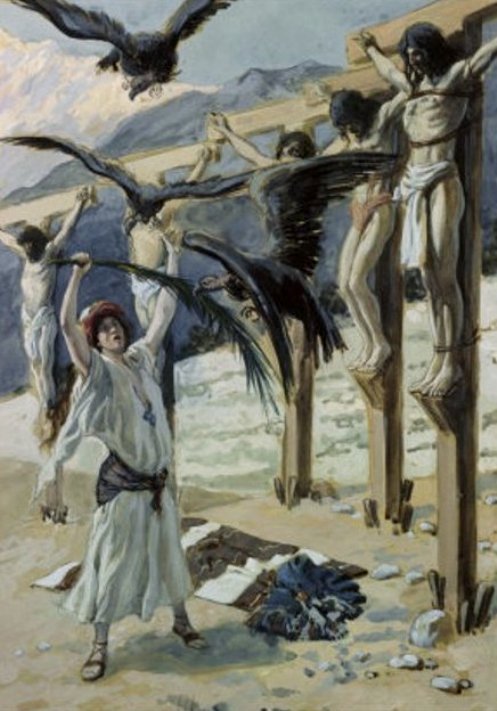
The Kindness of Rizpah, James Tissot
Rizpah, Frederich Lord Leighton
Rispah, Joseph Turner
Rizpah, George Becker
And along the same lines….
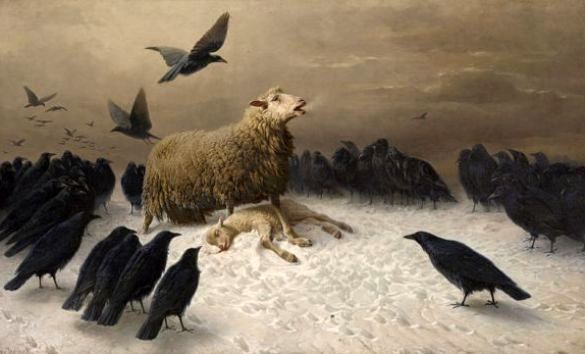
Anguish, Augustus Friedrich Albrecht Schenck
The Bible text
2 Samuel 3:1, 6-7
1 There was a long war between the house of Saul and the house of David; David grew stronger and stronger, while the house of Saul became weaker and weaker….. 6 While there was war between the house of Saul and the house of David, Abner was making himself strong in the house of Saul. 7 Now Saul had a concubine, whose name was Rizpah, the daughter of Ai’ah; and Ish-bo’sheth said to Abner, “Why have you gone in to my father’s concubine?”
2 Samuel 21:1-14
1 Now there was a famine in the days of David for three years, year after year; and David sought the face of the LORD. And the LORD said, “There is bloodguilt on Saul and on his house, because he put the Gib’eonites to death.” 2 So the king called the Gib’eonites. Now the Gib’eonites were not of the people of Israel, but of the remnant of the Amorites; although the people of Israel had sworn to spare them, Saul had sought to slay them in his zeal for the people of Israel and Judah. 3 And David said to the Gib’eonites, “What shall I do for you? And how shall I make expiation, that you may bless the heritage of the LORD?” 4 The Gib’eonites said to him, “It is not a matter of silver or gold between us and Saul or his house; neither is it for us to put any man to death in Israel.” And he said, “What do you say that I shall do for you?” 5 They said to the king, “The man who consumed us and planned to destroy us, so that we should have no place in all the territory of Israel, 6 let seven of his sons be given to us, so that we may hang them up before the LORD at Gibeon on the mountain of the LORD.” And the king said, “I will give them.”
7 But the king spared Mephib’osheth, the son of Saul’s son Jonathan, because of the oath of the LORD which was between them, between David and Jonathan the son of Saul. 8 The king took the two sons of Rizpah the daughter of Ai’ah, whom she bore to Saul, Armo’ni and Mephib’osheth; and the five sons of Merab the daughter of Saul, whom she bore to A’dri-el the son of Barzil’lai the Meho’lathite; 9 and he gave them into the hands of the Gib’eonites, and they hanged them on the mountain before the LORD, and the seven of them perished together. They were put to death in the first days of harvest, at the beginning of barley harvest.
10 Then Rizpah the daughter of Ai’ah took sackcloth, and spread it for herself on the rock, from the beginning of harvest until rain fell upon them from the heavens; and she did not allow the birds of the air to come upon them by day, or the beasts of the field by night.
11 When David was told what Rizpah the daughter of Ai’ah, the concubine of Saul, had done, 12 David went and took the bones of Saul and the bones of his son Jonathan from the men of Ja’besh-gil’ead, who had stolen them from the public square of Beth-shan, where the Philistines had hanged them, on the day the Philistines killed Saul on Gilbo’a; 13 and he brought up from there the bones of Saul and the bones of his son Jonathan; and they gathered the bones of those who were hanged. 14 And they buried the bones of Saul and his son Jonathan in the land of Benjamin in Zela, in the tomb of Kish his father; and they did all that the king commanded. And after that God heeded supplications for the land.
Appendix: Saul and his sons die at Gilboa
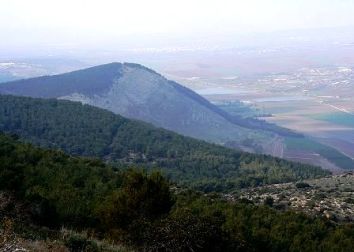
Where it happened:
the slopes of Mount Gilboa
1 Samuel 29, 31
The Philistines cornered King Saul on the mountain called Gilboa. The wounded king saw his three sons killed one by one, including David’s one-time friend Jonathan. Then Saul prepared to die.
Above all, he dreaded being taken alive. If the Philistines captured him they would torture him before they killed him. Saul did not want to be humiliated by his enemies, so he begged his armor-bearer to finish him off.
But the armor-bearer would not do it. He feared he would be blamed for killing his king. In desperation Saul propped his sword in an upright position and fell forward onto the point, so that it pierced his chest. When the armor-bearer saw that his king was dead, he too fell on his sword.

Saul’s fate
The Philistines soon found the bodies. They
- cut off Saul’s head and stripped his armor from his body
- gave the armor as a gift to their god Ashteroth
- placed his severed head in the temple of Dagon
- reserved a more gruesome fate for the bodies of Saul and his sons, hanging them from the walls of one of their cities, to stink and rot.
This was more than just gruesome savagery. Severing the head from the body separated the soul from its home, so that the person who died could not find rest in eternity. It was ritual revenge.
But Saul’s Israelite soldiers could not accept this. They went in secret during the night and pulled down the mangled bodies, then took them to their own town, Jabesh. Here they cremated the bodies and gave the bones an honorable burial.
This was what Rizpah expected to happen to her sons. When it did not, she was forced to take matters into her own hands, keeping a vigil over their rotting bodies.
Rizpah means ‘hot stone’; she was the concubine of Saul and had two sons by him
Saul means ‘the one who is asked for, prayed for’; he was the first king of Israel
David means ‘the beloved’; he was a brilliant adventurer who defeated King Saul and took the throne
Abner means ‘a light’ or ‘the father of light’; he was King Saul’s first cousin and chief army general; he was also the power behind the throne after the death of Saul
Ishbosheth’s name may be connected to the agricultural god Baal; he was the fourth and only surviving son of King Saul after the Battle of Mount Gilboa
Mephibosheth and Armoni were the two murdered sons of Rizpah
Main theme of the story:
a mother’s courage and devotion, even in the face of death
Read about more fascinating women
of the Old and New Testaments
Search Box
![]()
Bible Study Resource for Women in the Bible:
Rizpah, concubine of King Saul, mother of two murdered sons
© Copyright 2006
Elizabeth Fletcher

